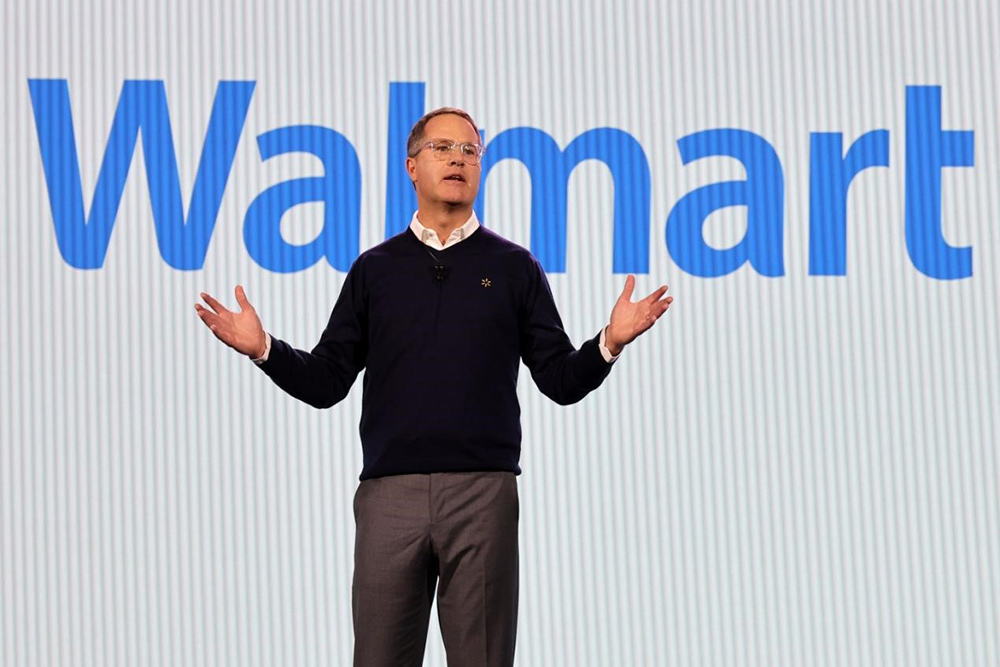
唐納德·特朗普總統(tǒng)的關(guān)稅政策令全美商界領(lǐng)袖膽戰(zhàn)心驚,,但卻有幾家零售業(yè)巨頭的首席執(zhí)行官在這場(chǎng)風(fēng)暴中顯得相對(duì)鎮(zhèn)定,。
上個(gè)月,特朗普威脅對(duì)墨西哥,、加拿大和中國(guó)全面加征關(guān)稅,。盡管北美鄰國(guó)暫時(shí)獲得兩次豁免,但朝令夕改的政策制定方式仍引起了市場(chǎng)恐慌,尤其是在特朗普拒絕排除這些政策可能在今年晚些時(shí)候引發(fā)經(jīng)濟(jì)衰退的可能性之后,。
一些商界領(lǐng)袖已對(duì)新增關(guān)稅發(fā)出嚴(yán)厲警告,,福特(Ford)首席執(zhí)行官吉姆·法利甚至斷言此舉將“對(duì)美國(guó)工業(yè)造成前所未見(jiàn)的打擊”。但多位零售業(yè)的首席執(zhí)行官在近期的財(cái)報(bào)電話會(huì)議上,,對(duì)貿(mào)易戰(zhàn)前景卻表現(xiàn)得相當(dāng)樂(lè)觀,,理由是其已經(jīng)實(shí)現(xiàn)了供應(yīng)鏈多元化,且擁有應(yīng)對(duì)關(guān)稅的歷史經(jīng)驗(yàn),。
沃爾瑪(Walmart Inc)首席執(zhí)行官董明倫上個(gè)月表示:“關(guān)稅是我們多年來(lái)一直在應(yīng)對(duì)的課題,,未來(lái)我們也將繼續(xù)面對(duì)這個(gè)問(wèn)題?!奔业脤殻℉ome Depot)首席執(zhí)行官泰德·德克爾呼應(yīng)了這一觀點(diǎn),,稱“我們經(jīng)歷過(guò)類(lèi)似局面,我相信我們擁有最優(yōu)秀的團(tuán)隊(duì),,足以應(yīng)對(duì)任何可能廣泛影響整個(gè)行業(yè)的關(guān)稅環(huán)境”,。塔吉特(Target)首席執(zhí)行官布萊恩·康奈爾上周同樣表現(xiàn)得相當(dāng)冷靜,他向投資者表示該公司“以往曾成功應(yīng)對(duì)關(guān)稅挑戰(zhàn)”,。
在特朗普首個(gè)任期內(nèi),,許多零售商就不得不進(jìn)行關(guān)稅談判。而且過(guò)去十年間,,他們持續(xù)推進(jìn)供應(yīng)鏈多元化,,不斷擴(kuò)大采購(gòu)來(lái)源國(guó)范圍。以服裝為主營(yíng)業(yè)務(wù)的零售商尤其如此,,例如Abercrombie & Fitch和Gap兩家公司在近期的財(cái)報(bào)電話會(huì)議中都強(qiáng)調(diào)其全球多元化采購(gòu)布局,。彭博社的分析顯示,2017年,,中國(guó)制造服裝占美國(guó)進(jìn)口服裝總量的34%,,到2023年,該比例已降至20%,,產(chǎn)能轉(zhuǎn)移至越南,、孟加拉國(guó)等地。
但這并不意味著所有零售企業(yè)都高枕無(wú)憂,。百思買(mǎi)(Best Buy)首席執(zhí)行官科里·巴里指出,,雖然該公司直接進(jìn)口商品僅占銷(xiāo)售額的約2%,其余銷(xiāo)售額均來(lái)自電子產(chǎn)品供應(yīng)商,,但關(guān)稅可能引發(fā)的連鎖反應(yīng),,最終會(huì)轉(zhuǎn)嫁至消費(fèi)者。巴里表示:“預(yù)計(jì)各品類(lèi)供應(yīng)商都會(huì)將部分關(guān)稅成本轉(zhuǎn)嫁給零售商,,美國(guó)消費(fèi)者極可能面臨漲價(jià),?!卑偎假I(mǎi)預(yù)估2025年關(guān)稅可能使可比銷(xiāo)售額下降約1%。
克羅格(Kroger)等食品雜貨企業(yè)的高管預(yù)計(jì),,生菜等生鮮食品可能漲價(jià),,冬季從氣候較溫暖的墨西哥進(jìn)口的其他日常必需品價(jià)格也會(huì)上漲。沃爾瑪,、塔吉特等大型零售商的生鮮業(yè)務(wù)也面臨同樣的情況,。康奈爾表示,,若關(guān)稅生效,,消費(fèi)者將很快感受到新鮮果蔬等商品在“數(shù)日內(nèi)”價(jià)格上漲。
無(wú)論近期關(guān)稅政策如何演變,,特朗普的最新舉措正促使眾多美國(guó)企業(yè)持續(xù)分散海外供應(yīng)商布局,。孩之寶(Hasbro)首席執(zhí)行官克里斯·科克斯向華爾街分析師透露,該公司計(jì)劃“在未來(lái)兩年內(nèi)將中國(guó)產(chǎn)玩具和游戲產(chǎn)品在美國(guó)市場(chǎng)的占比從50%降至40%以下”,。
盡管美國(guó)零售業(yè)巨頭的首席執(zhí)行官們表現(xiàn)鎮(zhèn)定,,但周一股市的拋售潮預(yù)示著貿(mào)易戰(zhàn)可能將美國(guó)經(jīng)濟(jì)拖入衰退。美國(guó)零售聯(lián)合會(huì)(National Retail Federation)估算,,現(xiàn)行關(guān)稅每年可能導(dǎo)致美國(guó)消費(fèi)者的購(gòu)買(mǎi)力削減460億至780億美元。零售業(yè)高管們,,即便在關(guān)稅戰(zhàn)中身經(jīng)百戰(zhàn)的從業(yè)者,,都對(duì)此保持高度警覺(jué)。
塔吉特首席財(cái)務(wù)官吉姆·李坦言:“我們無(wú)法預(yù)知的是,,關(guān)稅在整個(gè)經(jīng)濟(jì)體系中的連鎖反應(yīng),,將如何影響整體消費(fèi)需求的變化?!?(財(cái)富中文網(wǎng))
譯者:劉進(jìn)龍
審校:汪皓
唐納德·特朗普總統(tǒng)的關(guān)稅政策令全美商界領(lǐng)袖膽戰(zhàn)心驚,,但卻有幾家零售業(yè)巨頭的首席執(zhí)行官在這場(chǎng)風(fēng)暴中顯得相對(duì)鎮(zhèn)定。
上個(gè)月,,特朗普威脅對(duì)墨西哥,、加拿大和中國(guó)全面加征關(guān)稅。盡管北美鄰國(guó)暫時(shí)獲得兩次豁免,,但朝令夕改的政策制定方式仍引起了市場(chǎng)恐慌,,尤其是在特朗普拒絕排除這些政策可能在今年晚些時(shí)候引發(fā)經(jīng)濟(jì)衰退的可能性之后。
一些商界領(lǐng)袖已對(duì)新增關(guān)稅發(fā)出嚴(yán)厲警告,,福特(Ford)首席執(zhí)行官吉姆·法利甚至斷言此舉將“對(duì)美國(guó)工業(yè)造成前所未見(jiàn)的打擊”,。但多位零售業(yè)的首席執(zhí)行官在近期的財(cái)報(bào)電話會(huì)議上,對(duì)貿(mào)易戰(zhàn)前景卻表現(xiàn)得相當(dāng)樂(lè)觀,,理由是其已經(jīng)實(shí)現(xiàn)了供應(yīng)鏈多元化,,且擁有應(yīng)對(duì)關(guān)稅的歷史經(jīng)驗(yàn)。
沃爾瑪(Walmart Inc)首席執(zhí)行官董明倫上個(gè)月表示:“關(guān)稅是我們多年來(lái)一直在應(yīng)對(duì)的課題,未來(lái)我們也將繼續(xù)面對(duì)這個(gè)問(wèn)題,?!奔业脤殻℉ome Depot)首席執(zhí)行官泰德·德克爾呼應(yīng)了這一觀點(diǎn),稱“我們經(jīng)歷過(guò)類(lèi)似局面,,我相信我們擁有最優(yōu)秀的團(tuán)隊(duì),,足以應(yīng)對(duì)任何可能廣泛影響整個(gè)行業(yè)的關(guān)稅環(huán)境”。塔吉特(Target)首席執(zhí)行官布萊恩·康奈爾上周同樣表現(xiàn)得相當(dāng)冷靜,,他向投資者表示該公司“以往曾成功應(yīng)對(duì)關(guān)稅挑戰(zhàn)”,。
在特朗普首個(gè)任期內(nèi),許多零售商就不得不進(jìn)行關(guān)稅談判,。而且過(guò)去十年間,,他們持續(xù)推進(jìn)供應(yīng)鏈多元化,不斷擴(kuò)大采購(gòu)來(lái)源國(guó)范圍,。以服裝為主營(yíng)業(yè)務(wù)的零售商尤其如此,,例如Abercrombie & Fitch和Gap兩家公司在近期的財(cái)報(bào)電話會(huì)議中都強(qiáng)調(diào)其全球多元化采購(gòu)布局。彭博社的分析顯示,,2017年,,中國(guó)制造服裝占美國(guó)進(jìn)口服裝總量的34%,到2023年,,該比例已降至20%,,產(chǎn)能轉(zhuǎn)移至越南、孟加拉國(guó)等地,。
但這并不意味著所有零售企業(yè)都高枕無(wú)憂,。百思買(mǎi)(Best Buy)首席執(zhí)行官科里·巴里指出,雖然該公司直接進(jìn)口商品僅占銷(xiāo)售額的約2%,,其余銷(xiāo)售額均來(lái)自電子產(chǎn)品供應(yīng)商,,但關(guān)稅可能引發(fā)的連鎖反應(yīng),最終會(huì)轉(zhuǎn)嫁至消費(fèi)者,。巴里表示:“預(yù)計(jì)各品類(lèi)供應(yīng)商都會(huì)將部分關(guān)稅成本轉(zhuǎn)嫁給零售商,,美國(guó)消費(fèi)者極可能面臨漲價(jià)?!卑偎假I(mǎi)預(yù)估2025年關(guān)稅可能使可比銷(xiāo)售額下降約1%,。
克羅格(Kroger)等食品雜貨企業(yè)的高管預(yù)計(jì),生菜等生鮮食品可能漲價(jià),,冬季從氣候較溫暖的墨西哥進(jìn)口的其他日常必需品價(jià)格也會(huì)上漲,。沃爾瑪、塔吉特等大型零售商的生鮮業(yè)務(wù)也面臨同樣的情況,??的螤柋硎?,若關(guān)稅生效,消費(fèi)者將很快感受到新鮮果蔬等商品在“數(shù)日內(nèi)”價(jià)格上漲,。
無(wú)論近期關(guān)稅政策如何演變,,特朗普的最新舉措正促使眾多美國(guó)企業(yè)持續(xù)分散海外供應(yīng)商布局。孩之寶(Hasbro)首席執(zhí)行官克里斯·科克斯向華爾街分析師透露,,該公司計(jì)劃“在未來(lái)兩年內(nèi)將中國(guó)產(chǎn)玩具和游戲產(chǎn)品在美國(guó)市場(chǎng)的占比從50%降至40%以下”,。
盡管美國(guó)零售業(yè)巨頭的首席執(zhí)行官們表現(xiàn)鎮(zhèn)定,但周一股市的拋售潮預(yù)示著貿(mào)易戰(zhàn)可能將美國(guó)經(jīng)濟(jì)拖入衰退,。美國(guó)零售聯(lián)合會(huì)(National Retail Federation)估算,,現(xiàn)行關(guān)稅每年可能導(dǎo)致美國(guó)消費(fèi)者的購(gòu)買(mǎi)力削減460億至780億美元。零售業(yè)高管們,,即便在關(guān)稅戰(zhàn)中身經(jīng)百戰(zhàn)的從業(yè)者,,都對(duì)此保持高度警覺(jué)。
塔吉特首席財(cái)務(wù)官吉姆·李坦言:“我們無(wú)法預(yù)知的是,,關(guān)稅在整個(gè)經(jīng)濟(jì)體系中的連鎖反應(yīng),,將如何影響整體消費(fèi)需求的變化?!?(財(cái)富中文網(wǎng))
譯者:劉進(jìn)龍
審校:汪皓
As President Donald Trump’s tariff policies strike fear in the hearts of business leaders across the U.S., a handful of major retail CEOs are sounding relatively calm about the whole ordeal.
Last month, Trump threatened to impose across-the-board levies on Mexico, Canada and China. Although those North American partners have received two reprieves, the on-again-off-again policymaking is spooking the markets, especially after the president refused to rule out the possibility of those policies creating a recession later this year.
Some business leaders have issued dire warnings about the new tariffs, with Ford CEO Jim Farley going as far as to say they will “blow a hole in the U.S. industry that we have never seen.” But several retail CEOs have been downright sanguine about the prospect of a trade war on recent earnings calls, citing their diversified supply chains, and previous experience weathering tariffs.
“Tariffs are something we’ve managed for many years, and we’ll just continue to manage that,” said Walmart Inc CEO Doug McMillon last month. Home Depot CEO Ted Decker echoed that sentiment, saying “we’ve been through that before, and I think we have the best team to manage through any tariff environment which would impact the industry broadly.” Target chief Brian Cornell was equally even keeled last week, telling investors that the company has “managed through tariffs in the past.”
Many retailers were forced to negotiate tariffs during Trump’s first term. And they have also spent the past decade diversifying their supply chains, and expanding the number of countries from which they buy their merchandise. That’s particularly true for clothing-focused retailers like Abercrombie & Fitch and Gap, both of whom touted diversified geographical sourcing on recent earnings calls. Apparel made in China represented 34% of clothing imported to the U.S. in 2017, according to a Bloomberg analysis. By 2023, that number was down to 20%, as countries moved their production to places like Vietnam and Bangladesh.
But that’s not to say that all retail companies are feeling calm. Best Buy CEO Corie Barry said that while the company only directly imports 2% or so of what it sells, the rest coming from electronics vendors, the tariffs could cause a ripple effect that would ultimately hit consumers. “We expect our vendors across our entire assortment will pass along some level of tariff costs to retailers, making price increases for American consumers highly likely,” Barry said. Best Buy estimates the tariffs could hit comparable sales in 2025 to the tune of 1%.
Grocery executives at Kroger ] also expect fresh food like lettuce to get more expensive, along with other staples that U.S. companies import from warmer Mexican climates during the winter. That applies to the burgeoning grocery businesses of big box retailers like Walmart and Target as well. Cornell said that if tariffs go into effect, consumers would see price hikes on items like fresh fruit and vegetables “within days.”
No matter what happens with tariffs in the near future, Trump’s latest moves are prompting a number of U.S. companies to keep diversifying their overseas suppliers base. Hasbro CEO Chris Cocks told Wall Street analysts that the company was “on a path to move from 50% of our U.S. toy and game volume originating from China to under 40% over the next two years.”
And despite the unruffled demeanor of America’s top retail CEOs, Wall Street’s selloff on Monday suggests that trade wars could sink the economy into a recession. The National Retail Federation has estimated American consumers’ spending power could fall by between $46 billion and $78 billion every year they are in place. And that does indeed have retail executives, even veterans of the tariff wars, watching closely.
“What we don’t know is the potential consumer demand that’s across the board based on how tariffs ripple across the economy,” said Target finance chief Jim Lee.






